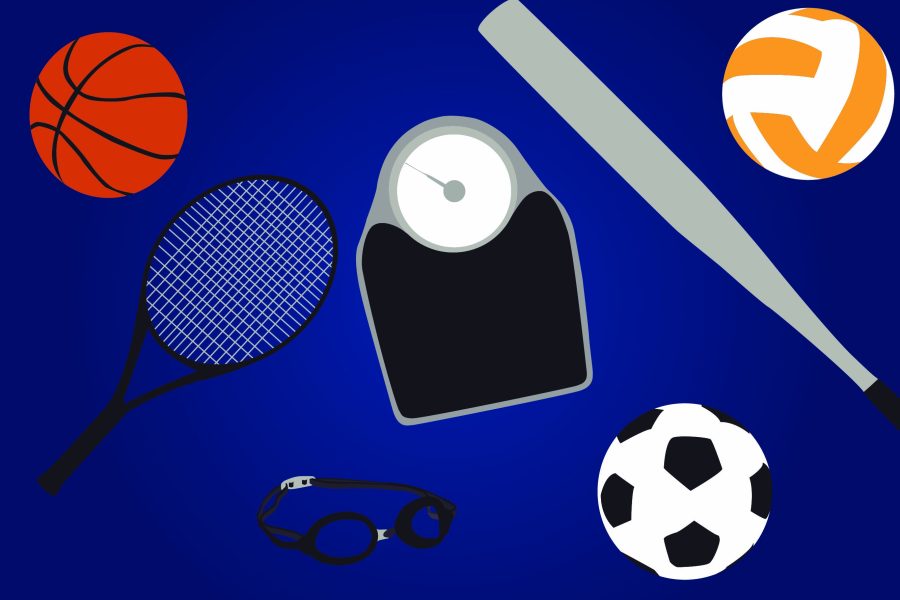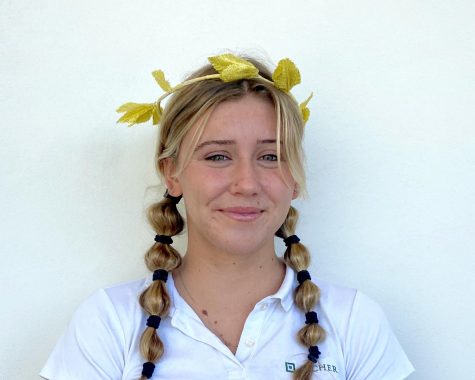Op-Ed: Food for thought, fuel for your body
Photo credit: Molly Solowitz
Being a teenage girl that’s also an athlete is challenging for body image. Expectations of strength and performance in one part of life, and societal pressures of thin bodies and skipped meals in the other. We must learn to love our bodies and appreciate the fuel we give them.
October 3, 2021
I love food. From exploring various cuisines to snacking on my comfort foods, eating is, and should be, a pleasure in life. I also love my sport, swimming. I love the feeling of the water after a stressful day, racing others and feeling exhausted and accomplished at the end of a hard practice. I love these two parts of life–exercising and food– they go hand-in-hand until they don’t.
Growing up I’ve always been active, and with a “fast metabolism,” when I wasn’t busy I was eating. I’d find myself eating more than my parents at dinner, but it was fine because I was constantly hearing how skinny I was. As my activity level increased, so did my calorie intake, as was appropriate. Nearly 20 hours a week of exercise requires proper fuel not only to complete the workouts but to improve and push myself to the next level.
Then puberty hit. I found my face, hips and legs filling out and was caught off guard. My fast metabolism and thin frame had been a significant part of my life for the past 14 years, and I was distraught with the sudden change. I began to look at the girls around me and compare my arms, legs and stomach like I never had before. I was still eating as I was earlier, but I began to check myself in the mirror and on the scale obsessively; my weight was in my thoughts morning and night, just sitting in my head.
My meal sizes and eating habits diminished. Calorie counting, meal planning and disordered eating behaviors. It was easy for this to go unnoticed by friends and family with a simple wave of my hand or excuse of a stomach ache. Girls all around me acted and felt the same, and we lived in a mutual understanding.
Skipping a meal as a high school student at school isn’t uncommon. As hard as our school works to promote body positivity, left and right you hear comments on how bloated someone feels or how they look fat in their shirt. We see girls our age modeling and trying to get skinny for the summer in the city where we live in short shorts and bikinis. Moments like these are unavoidable, but when you’re already in that mindset, it becomes a rabbit-hole that gets harder to escape.
This harmful behavior began to crossover into my athletic life. When your caloric intake should be near 4,000 calories, and you’re barely fueling enough for a regular person’s daily intake, you will see the consequences. I was weak in my swimming and hungry before and after every practice, but I had become obsessed with the calories burned per practice rather than my performance.
I was concerned with attending every workout, not because I wanted every chance to improve, but because I needed to burn the calories. My sport only exacerbated the situation, being in minimal coverage and surrounded by, what I only saw as, toned and slim athletes. Slowed performance in practice led to slower performances in competitions, yet I couldn’t come to terms with my situation and its cause and effect.
My grand epiphany came when I gave in actually ate enough for my athletic needs in a week, leading up to a competition and suddenly I was racing and dropping time for the first time in a year. My coaches and I were shocked. Where had this sudden improvement come from if I had been working just as hard for the months prior?
Shocker; I ate.
In that moment I understood I needed to establish my priorities, and that being able to compete and love my sport is more important than my misguided judgments of my own body. I began to understand that being healthy is so valuable to a body.
For any other person, athlete or not, dealing with these thoughts and behaviors: I know reading or hearing the same things about body positivity and acceptance won’t change your mind if it hasn’t already. Know that your duty to yourself is to keep yourself energized and balanced, and your thoughts are put to far better use when thinking about school and life over calories.
Enjoy your meals and make the most out of the energy it gives you. Your body is the only one you have, and the decisions you make about it now can and will impact you long term. Our school works to create confident female leaders, but you must first learn to be confident in the body that you will lead in.










Brian Wogensen • Oct 13, 2021 at 5:41 pm
I really appreciate the candor and thoughtfulness in this, Thea. Nicely written as well!